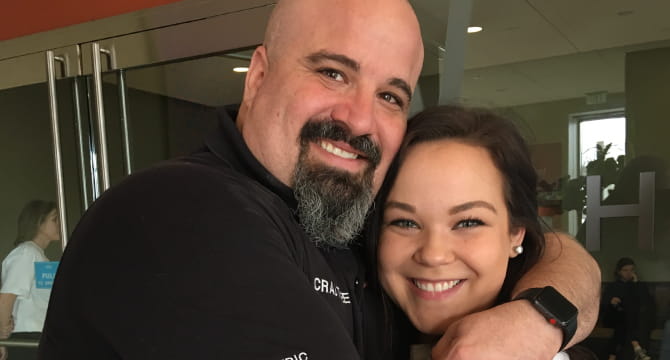After 5 years, cardiac arrest survivor finds her rescuer
By American Heart Association News

Heidi Stewart with paramedic David Crabtree on the day she finally found him. (Photo courtesy of Heidi Stewart)
When Heidi Stewart’s heart stopped at age 18 in her high school in Vancouver, Washington, quick-acting school administrators and teachers jumped into action, starting CPR.
Taking turns, the principal and teachers kept Stewart alive until the EMS team arrived.
She was able to thank the teachers and principal when they visited her in the hospital. But Stewart, now 23, had always wanted to find and thank the paramedic who was in the ambulance with her en route to the hospital that day five years ago. She credited him with helping her survive, and she wanted to say thank you.
“He was just a very comforting soul. He kept me calm and made me feel safe,” Stewart said.
But all she could remember about him was that he had fire tattoos on both arms.
With little to go on, her attempts to find him went nowhere. Yet for five years, she kept asking, looking for him at various events where she volunteers, hoping to find the paramedic with the fire tattoos.
Finally, after more than five years, Stewart found her hero.
Her parents, Anne and William, were volunteering at a CPR training at the Quinn Driscoll Foundation Heart Screenings in North Garrison Heights, Washington.
“I got a text,” Stewart said. It was from her dad. “We found him,” it read.
Stewart knew exactly what that meant. “I still to this day kind of lose it, just thinking about it.”
For paramedic David Crabtree, the day had started out like any other when he works an event.
“I was walking by a booth, start talking to a guy, and he starts telling me a story about his daughter’s event. And then I said, ‘Oh my gosh, you’re describing me!’”
When Stewart and Crabtree met later that day, “It was incredible. It was breathtaking,” Stewart said. Through tears, Stewart was finally able to say the simple words she’d been longing to say for years: Thank you.
For her, the moment allowed her to share from her heart the deep gratitude she had been carrying around for years. And, it allowed her, in some way, to close the loop.
For Crabtree, the moment was unmitigated joy.
“It’s not very often that you receive feedback on anything like that,” he said. A lot of calls are “fairly routine,” and do not involve saving a life – especially a young person’s life, he said. As a father, he felt particularly touched and concerned when he and others on his team responded to the call.
He had often wondered how Stewart, who was diagnosed with ARVD, or arrhythmogenic right ventricular dysplasia, had fared. He had heard she had survived, “but when I got to meet her, she told me she had gone to college and was now working … You don’t get these stories very often.”
If you have questions or comments about this story, please email [email protected].




